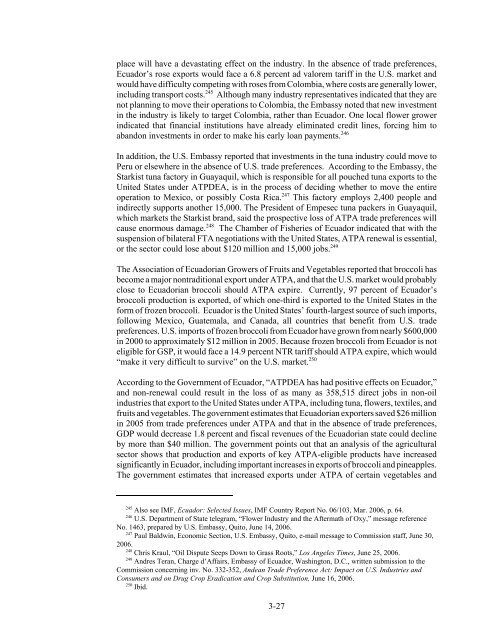The Impact of the Andean Trade Preference Act Twelfth ... - USITC
The Impact of the Andean Trade Preference Act Twelfth ... - USITC
The Impact of the Andean Trade Preference Act Twelfth ... - USITC
- No tags were found...
You also want an ePaper? Increase the reach of your titles
YUMPU automatically turns print PDFs into web optimized ePapers that Google loves.
place will have a devastating effect on <strong>the</strong> industry. In <strong>the</strong> absence <strong>of</strong> trade preferences,Ecuador’s rose exports would face a 6.8 percent ad valorem tariff in <strong>the</strong> U.S. market andwould have difficulty competing with roses from Colombia, where costs are generally lower,including transport costs. 245 Although many industry representatives indicated that <strong>the</strong>y arenot planning to move <strong>the</strong>ir operations to Colombia, <strong>the</strong> Embassy noted that new investmentin <strong>the</strong> industry is likely to target Colombia, ra<strong>the</strong>r than Ecuador. One local flower growerindicated that financial institutions have already eliminated credit lines, forcing him toabandon investments in order to make his early loan payments. 246In addition, <strong>the</strong> U.S. Embassy reported that investments in <strong>the</strong> tuna industry could move toPeru or elsewhere in <strong>the</strong> absence <strong>of</strong> U.S. trade preferences. According to <strong>the</strong> Embassy, <strong>the</strong>Starkist tuna factory in Guayaquil, which is responsible for all pouched tuna exports to <strong>the</strong>United States under ATPDEA, is in <strong>the</strong> process <strong>of</strong> deciding whe<strong>the</strong>r to move <strong>the</strong> entireoperation to Mexico, or possibly Costa Rica. 247 This factory employs 2,400 people andindirectly supports ano<strong>the</strong>r 15,000. <strong>The</strong> President <strong>of</strong> Empesec tuna packers in Guayaquil,which markets <strong>the</strong> Starkist brand, said <strong>the</strong> prospective loss <strong>of</strong> ATPA trade preferences willcause enormous damage. 248 <strong>The</strong> Chamber <strong>of</strong> Fisheries <strong>of</strong> Ecuador indicated that with <strong>the</strong>suspension <strong>of</strong> bilateral FTA negotiations with <strong>the</strong> United States, ATPA renewal is essential,or <strong>the</strong> sector could lose about $120 million and 15,000 jobs. 249<strong>The</strong> Association <strong>of</strong> Ecuadorian Growers <strong>of</strong> Fruits and Vegetables reported that broccoli hasbecome a major nontraditional export under ATPA, and that <strong>the</strong> U.S. market would probablyclose to Ecuadorian broccoli should ATPA expire. Currently, 97 percent <strong>of</strong> Ecuador’sbroccoli production is exported, <strong>of</strong> which one-third is exported to <strong>the</strong> United States in <strong>the</strong>form <strong>of</strong> frozen broccoli. Ecuador is <strong>the</strong> United States’ fourth-largest source <strong>of</strong> such imports,following Mexico, Guatemala, and Canada, all countries that benefit from U.S. tradepreferences. U.S. imports <strong>of</strong> frozen broccoli from Ecuador have grown from nearly $600,000in 2000 to approximately $12 million in 2005. Because frozen broccoli from Ecuador is noteligible for GSP, it would face a 14.9 percent NTR tariff should ATPA expire, which would“make it very difficult to survive” on <strong>the</strong> U.S. market. 250According to <strong>the</strong> Government <strong>of</strong> Ecuador, “ATPDEA has had positive effects on Ecuador,”and non-renewal could result in <strong>the</strong> loss <strong>of</strong> as many as 358,515 direct jobs in non-oilindustries that export to <strong>the</strong> United States under ATPA, including tuna, flowers, textiles, andfruits and vegetables. <strong>The</strong> government estimates that Ecuadorian exporters saved $26 millionin 2005 from trade preferences under ATPA and that in <strong>the</strong> absence <strong>of</strong> trade preferences,GDP would decrease 1.8 percent and fiscal revenues <strong>of</strong> <strong>the</strong> Ecuadorian state could declineby more than $40 million. <strong>The</strong> government points out that an analysis <strong>of</strong> <strong>the</strong> agriculturalsector shows that production and exports <strong>of</strong> key ATPA-eligible products have increasedsignificantly in Ecuador, including important increases in exports <strong>of</strong> broccoli and pineapples.<strong>The</strong> government estimates that increased exports under ATPA <strong>of</strong> certain vegetables and245 Also see IMF, Ecuador: Selected Issues, IMF Country Report No. 06/103, Mar. 2006, p. 64.246 U.S. Department <strong>of</strong> State telegram, “Flower Industry and <strong>the</strong> Aftermath <strong>of</strong> Oxy,” message referenceNo. 1463, prepared by U.S. Embassy, Quito, June 14, 2006.247Paul Baldwin, Economic Section, U.S. Embassy, Quito, e-mail message to Commission staff, June 30,2006.248 Chris Kraul, “Oil Dispute Seeps Down to Grass Roots,” Los Angeles Times, June 25, 2006.249Andres Teran, Charge d’Affairs, Embassy <strong>of</strong> Ecuador, Washington, D.C., written submission to <strong>the</strong>Commission concerning inv. No. 332-352, <strong>Andean</strong> <strong>Trade</strong> <strong>Preference</strong> <strong>Act</strong>: <strong>Impact</strong> on U.S. Industries andConsumers and on Drug Crop Eradication and Crop Substitution, June 16, 2006.250 Ibid.3-27
















